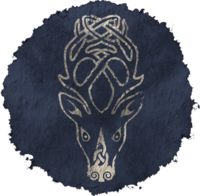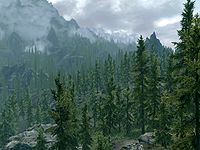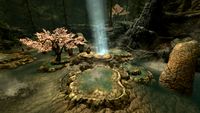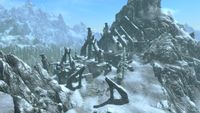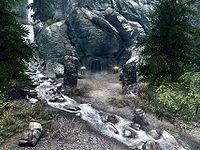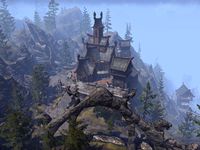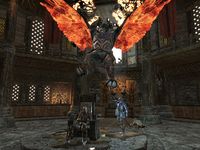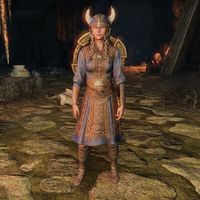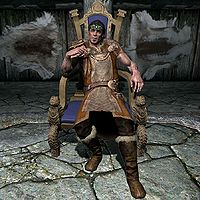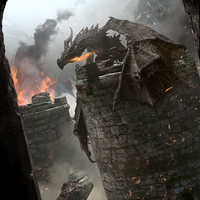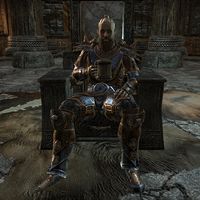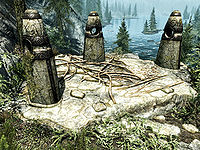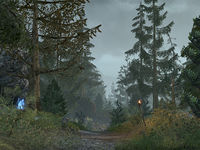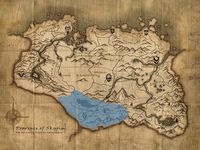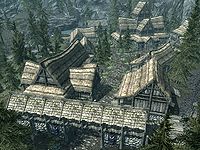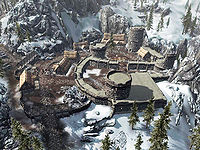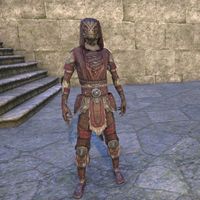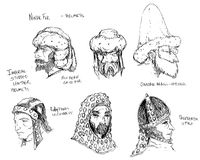Lore:Falkreath Hold
| Falkreath | |
|---|---|
| Type | Region |
| Continent | Tamriel |
| Province | Skyrim |
| Subregions | Bloodlet Peaks Brittleshin Hills Pine Forest |
| Appears in | Skyrim, ESO |
Falkreath Hold (or simply called Falkreath)[1]:573 is one of the main holds of Skyrim, known for its lush pine forest. Lake Ilinalta is the province's largest body of freshwater and it takes a significant portion of the hold.[1]:573 Falkreath has an ancient association with battle and death as its capital city is known as the "heroes' graveyard" and contains one of the largest sites in the province.[2][3] Its people are generally prosperous farmers and loggers, thanks to the Ilinalta.[1]:573 Throughout history, Falkreath has shifted between the Kingdom of Skyrim and the Colovian Estates, the autonomous government of western Cyrodiil.[4][5]
The region is a major thoroughfare in northern Tamriel as it branches the southern holds of Skyrim with the northern reaches of west-central Tamriel.[1]:573 It is historically neighbored by the Jerall Mountains to the south, the Reach to the northwest, the Rift to the east, and Whiterun Hold to the north.[6] From across the provincial border to the south, Falkreath is connected to northern Cyrodiil near County Bruma and Craglorn in northeast Hammerfell.[7][8]
Contents
Society and Ecosystem[edit]
Falkreath is predominantly inhabited by the Nords of Skyrim but many races have had at one point inhabited or laid claim to the region. Some of the other confirmed races include the Colovians,[4] the Keptu, the Minotaurs,[9][10] and the Orcs.[11] As stated earlier, the Nords of Falkreath Hold have a strong appreciation for battle and death. Many people in the capital city, from shops and families, draw inspiration from these topics in their names.[3] The grave in the capital city is considered the largest in the province.[2] The region's signature cheese dish, Barrowost resembles common eidar cheese but is exclusively aged in Nordic barrows. The cheese acquires an intense earthy sweetness and is punctuated with sharp notes. The Nords practice an ancient tradition with Barrowost called "grave curd" in which fresh cheese is interred atop of the coffin of the recently deceased. On every anniversary, the bereaved would eat a fifth of the cheese until it is finished.[3]
Falkreath Hold has been a sovereign state of the Colovian Estates throughout moments in history.[4] A merchant family from the late Second Era, the Far Falkreath Estate had strong ties to the Holds of Skyrim.[12] The Glenmoril Wyrd, more specifically the Hagfeather Coven has lived in western Falkreath since at least the mid Second Era. This coven in particular worships the Daedric Prince, Namira[13] but at some point, the coven that lived in Falkreath worshipped Hircine and were the ones to bestow lycanthropy to the Companions, starting with the Harbinger Terrfyg.[14][15]
The region's aptly named Pine Forest[16] is its main feature and it stretches between the borders toward the Reach and Whiterun, and the snow-laden country between the Throat of the World and the Jerall Mountains. It is dense with coniferous trees and a wide variety of flora. Some of these include mora tapinella,[17] all four varieties of mountain flower, nightshade,[18] nirnroot, and thistles.[19] There are also several samples of Snowberries throughout the eastern hills and the path toward Cyrodiil.[20] Anchored on one side by Helgen, there is a road between the two mountains called the Lion's Den and it is the hold's road to the Rift.[21][22]
Southeast of Falkreath's capital is one of the fabled Ancestor Glades, hidden groves across Tamriel where the Ritual of the Ancestor Moth can be performed. It is a ritual used by the Moth Priests to read Elder Scrolls and a draw knife is placed in the glade's central grotto to harvest the canticle tree and attract ancestor moths.[23] Falkreath's wildlife is varied, from the pine forest and snow mountains to Lake Ilinalta in the north. The Ilinalta is the province's largest body of water and its temperate water hosts many different types of fish. The common species include Abecean Longfin, Cyrodilic Spadetail, Histcarp, River Betty, Salmon, Silverside Perch, and Slaughterfish. Others include the Catfish, Pearlfish, Pygmy Sunfish, and the Spadefish.[24]
In the forest, Falkreath has several species of wolves, bears, frostbite spiders, and spriggans. The local Nords were able to tame sabre cats and train them as mounts.[25] The cave, Bloated Man's Grotto has an idyllic ecosystem that protects the wildlife from the harsh outside. Several types of butterflies live in the grotto, such as Blue Butterflies, the Monarch Butterfly, and even the Luna Moth.[26] The Pine Thrush is a bird commonly found in southern Skyrim and Falkreath.[27]
History[edit]
Ancient background[edit]
Falkreath's ancient history is tied to many cultures and people of the surrounding area. The region and its city were founded by Bjarfrud Skjoralmor, an ancient Nord warrior[9] but despite that, its name is of elvish origin.[1]:574 He discovered the forest inhabited by the "beastly host" of "their heathen wood" as his epitaph described them,[9] but as the Minotaur warrior, Domihaus puts it, it was the den of his ancestors and it was poached by the Nords.[10] The Orcs may have lived in Falkreath Hold as well since they returned in the early Second Era to claim land that they believed was their ancient right.[11]
Presumingly, ancient Falkreath was the home of a Nedic tribe called the Men-of-'kreath, one of several tribes that were herded by the Ayleids of the Cyrodilic heartland and taken to Sardavar Leed.[28] All of the Nedes that gathered eventually gave rise to the Alessian Slave Rebellion, which in turn overthrew the Ayleid Empire based in the White-Gold Tower. When those same elves tried to escape north into Skyrim, they were slaughtered by High King Vrage and his forces.[29] One of the region's oldest ruins is the Twilight Sepulcher, an important sanctum for Nocturnal, the Daedric Prince of Darkness and their followers. Deep in its halls is the Ebonmere, a portal to Nocturnal's plane of Oblivion, Evergloam. It has existed since long before recorded history.[30]
Unlike other parts of Skyrim, the Dragon Cult has only one known temple and that is Bleak Falls Barrow, located on the hills between Falkreath and Whiterun Hold. Its specific history is unknown but deep in its interior, the Keeper of the Dragonstone was buried and given the eternal mission to guard their namesake. The Dragonstone is a stone slab with a map of dragon burials all over Skyrim, a failsafe for when their patron, Alduin would return as a prophecy foretold. When the hold was formally established is unknown but some of its modern-day lands originally fell under Whiterun Hold's borders, specifically Granite Hill[31] in the early First Era. The court wizard, Farengar Secret-Fire believed that this occurred in the timespan just after the Dragon War.[32]
Early History[edit]
In the early First Era, Falkreath Hold took part in the War of Succession, a roughly half-a-century-long war for the High Kingship after the death of Borgas. Falkreath was one of many cities that fell victim to the rise of Jarl Olaf One-Eye.[33][34] Only a couple hundred years later would Falkreath Hold and southern Skyrim come into conflict again, and this time with the Alessian Order. The First Empire had at one point acquired southern Skyrim, only to lose it to the Nords ruled by High King Kjoric the White. Sometime around 1E 478, eight months before Rislav Larich became King of Skingrad, the High King died at the Battle of Sungard[35] while defending Falkreath city.[1]:574 And as the Moot was deciding on who shall succeed him, the Empire reclaimed Falkreath Hold. The Pact of Chieftains decided on Kjoric's son, Hoag Merkiller as the new High King of Skyrim and while accounts claim that he later died in the Battle of Glenumbra Moors,[36] a legend persists that Hoag died on the same spot his father did when he reclaimed Falkreath for the last time years later.[1]:574
By the late First Era, Falkreath and its environs were part of the Colovian Estates[4] and at the time, the estates and their enemies, the former Alessian-controlled Cyrodiil had come out of the War of Righteousness destitute in 1E 2331.[37][38] For the next four hundred years, the Colovian kings were desperate and greedy for wealth, or as the Remanada describes it, "through pride and habit as like thief-barons and forget covenants".[4] In 1E 2703, the Tsaesci of distant Akavir landed on the northern shores of Skyrim and Morrowind and cut a swathe down until they reached Falkreath's side of the Pale Pass, en route to Cyrodiil.[39][40] Reman assembled the disparate Colovians and the Nibenay to confront them at the mountain pass. The Imperials emerged victoriously and appointed Reman as the first Emperor of the Second Empire.[38]
The Kingdom of Western Skyrim[edit]
After the death of High King Logrolf in 2E 431, contention for the High Kingship of Skyrim was established between the Jarl of Solitude, Svartr and Logrolf's daughter, Freydis. In the end, two separate kingdoms were established between the east and the west, and Falkreath Hold left with High King Svartr to create the Kingdom of Western Skyrim.[41] Roughly around that time, Orsinium, a province previously acknowledged by the Potentate, Savirien-Chorak had been destroyed by the Bretons and many Orcish refugees flocked elsewhere. The Chieftain, Yashnag gro-Yazgu brought many of his people to build a chiefdom in western Falkreath, one of the largest examples of Orcish dominion to ever rise in Skyrim.[11]
Yashnag's chiefdom was a bane to the Nords of Falkreath Hold for thirty years and at some point in time, the chieftain killed the Jarl in the field of battle. His son, Hakkvild inherited the throne and a decrepit hold that was largely occupied by the Orcs. In 2E 467, Hakkvild challenged Yashnag and his champions in an obscure Orcish ritual trial by combat and single-handedly won each encounter. How he came to learn of this ritual is unknown, but Yashnag's followers fled Skyrim for the Wrothgarian Mountains[11] and Bangkorai[42] while Hakkvild burned the chiefdom down to the ground. The Jarl inherited the sobriquet, "Yashnag-Slayer" and continued the rule of his hold.[11] In 2E 566, Chief Kurog gro-Bagrakh assembled a force of Orcish warriors to reclaim Yashnag's former land in Falkreath. They were later pushed out by the Nords before he made his way west for Ranser's War.[43]
After the fall of the Longhouse Emperors in 2E 577, Falkreath Hold was caught in a minor albeit destructive conflict between the Second Legion and the former advisors of the Emperors, the Icereach Coven. The legionnaires chased the witches' coven north over the Jerall Mountains and confronted them north and west of Falkreath's capital. After the slaughter of legion soldiers, the coven took shelter in the graves west of the city. The witches managed to escape them when their matriarch, Mother Ciannait resurrected a horde of undead Nords and used illusion magic to strike fear into the soldiers. While the Second Legion retreated back to Cyrodiil, the Icereach Coven fled north to their home on the Sea of Ghosts.[44]
The Siege of Falkreath Hold[edit]
In 2E 582, citizens of Falkreath's capital were kidnapped by beasts at night and rumors started to spread around the city. Jarl Hjurgol Skjoralmor spoke on these rumors and dismissed them as nothing more than rumors.[45] At that same time, Reachmen raided villages across the countryside until folks were forced to flee into Falkreath.[46] These events culminated in the siege on Falkreath, conducted by an allied clan of Reachmen and Minotaurs called the Dreadhorn. The assault was led by the man-bull warrior, Domihaus the Bloody-Horned and his forces surrounded the city for weeks.[46]
While Jarl Hjurgol Skjoralmor was held up in his keep, his daughter, Thane Eerika Skjoralmor led a defense for the city and protected people within the walls.[47] A runner was sent to seek help and while they barely made it out of the city, Eerika's call to arms had reached the Undaunted, who sent warriors to help retake the city. These warriors arrived from the eastern outskirts of town and fought their way through the road until they found the city in the midst of a siege. With assistance from the Thane, the Undaunted secured the people's safety and killed Domihaus in the Jarl's keep. Amidst the chaos, the Jarl was killed and his daughter, Eerika inherited the throne.[47]
It is unknown if Falkreath Hold continued its association with the Kingdom of Western Skyrim. Both entities saw a drastic change in leadership in the same year, with Eerika inheriting the throne from her father and later Princess Svana taking the throne after the death of her father, High King Svargrim.[UOL 1][48]
Falkreath in the Third Empire[edit]
By the late Second Era, Falkreath was part of the Colovian Estates and its king, Cuhlecain wanted to unify the estates. But before he could do that, Cuhlecain needed to secure his borders to the north with the Reach, where the Nords and local Reachmen have warred for centuries. In an attempt to solidify his hold, he allied with Skyrim and chose his general, Hjalti Early-Beard to lead a small band of Colovian warriors and Nord berserkers. The Battle of Old Hroldan proved instrumental in Cuhlecain's efforts to unify the west, which came to fruition within a year later.[5]
The book, "Arcturian Heresy" states that Falkreath was part of western Cyrodiil. And while the estates followed Cuhlecain and later Tiber Septim at the start of the latter's campaign,[5] the Nordic kingdom followed suit sometime after the Battle of Sancre Tor in 2E 852[49] and Septim's unification of Cyrodiil in 2E 854.[5] The holds such as Falkreath were kingdoms under the Third Empire at the time[50][51] and like the rest of Skyrim, they supported Queen Potema Septim in the War of the Red Diamond.[52] When the Oblivion Crisis broke out in 3E 433, Skyrim was under siege and faced severe casualties, specifically in the Old Holds, where it was said everything between Falkreath and Windhelm was laid waste by the daedric hordes.[53]
Falkreath in the Skyrim Civil War[edit]
Sometime after the Pale Pass was re-discovered in 3E 433,[54] an inter-provincial road was established between Cyrodiil and Skyrim. The Pale Pass entered Skyrim through Falkreath Hold, specifically south of Helgen, and Fort Neugrad was there to guard the road between them.[55] By roughly 4E 180, the Empire had a strong military presence in the region, especially through the town, Helgen.[8]
After the death of High King Torygg in 4E 201, Skyrim's hold was divided amongst each other and the province delved into the Skyrim Civil War, between the Imperial Legion based in western Skyrim and the Stormcloaks, who rallied the Old Holds together for their common cause. Jarl Dengeir of Stuhn was a forthright supporter of the Stormcloak rebellion but over time vacated the hold's throne and was replaced by his nephew, Siddgeir, a supporter to the Empire.[2] The Legion based in Falkreath was spearheaded by Legate Skulnar and Fort Neugrad was a vital point of contention for control over the region.[56]
In that same year, the Imperial Legion captured Ulfric Stormcloak after a skirmish near Darkwater Crossing. The Jarl, Stormcloak soldiers, and other criminals were taken to Helgen, a town in southeast Falkreath to be publicly executed. In attendance was General Tullius, the Military Governor of Skyrim, and Elenwen, the First Emissary of the Thalmor.[57] Before the Jarl could be executed, however, a black dragon descended onto the town and razed it to the ground. In the ensuing destruction, Ulfric escaped town and fled back to Windhelm while a doom-driven hero escaped through Helgen's underbelly and made their way to Riverwood, the next town over. That hero, the Last Dragonborn began their quest to defeat the world-eater, Alduin and prevent the end times soon after.[57]
They later scaled the northern mountains to reach Bleak Falls Barrow and retrieve the Dragonstone.[58] At some point in time, the Penitus Oculatus tracked down the Dark Brotherhood holdout in Falkreath Hold and burned them out of their sanctuary. The attack was led by Commander Maro, the leader of the Penitus Oculatus in Skyrim and it is unknown if they survived or died out completely in the province.[59][60]
Known Rulers[edit]
- Unknown Period
- The Second Era
- Unnamed Jarl of Falkreath[11]
- Jarl Hakkvild Yashnag-Slayer (ca. 2E 467)[11]
- Jarl Hjurgol Skjoralmor (2E ? – 2E 582)[61]
- Jarl Eerika Skjoralmor (2E 582 – 2E ?)[61]
- King Cuhlecain (ca. 2E 852)[5]
- The Third Era
- The Fourth Era
- Jarl Dengeir of Stuhn[62]
- Jarl Siddgeir (ca. 4E 201)[62]
Notable Places[edit]
- Ancestor Glade
- One of the several ancestor glades of Tamriel, found high in the Jerall Mountains over Falkreath
- Bleak Falls Barrow
- A large Dragon cult temple over the mountains west of Riverwood, burial ground of the Dragonstone
- Falkreath
- The capital city of the hold, located on the main road between the region and the provincial border
- Fort Neugrad
- The regional stronghold of Falkreath, found on the main road north of the Pale Pass
- Granite Hill
- A town located somewhere in northwest Falkreath
- The Guardian Stones
- An ancient landmark next to the mouth of the White River, contains three standing stones
- Helgen
- An Imperial town on the east crossroad sometimes called the "Gateway to the North"
- Lake Ilinalta
- The largest inland body of water in Skyrim, found between Falkreath town and the Brittleshin Hills
- Twilight Sepulcher
- An ancient ruin with ties to Nocturnal and a gateway to her realm
Gallery[edit]
Notes[edit]
- Falkreath is distinguished by its pine forests but it is unknown if the obscure conflict, the War of the Pines is in reference to Falkreath's forest.[63]
- Falkreath Hold is excluded in The Holds of Skyrim, a book giving a basic outline of Skyrim's holds.[64]
See Also[edit]
- For game-specific information, see the Skyrim and Elder Scrolls Online
 articles.
articles.
Books[edit]
- Cheeses of Skyrim: Riften, Falkreath by B. — Descriptions of the cheeses of Skyrim
References[edit]
- ^ a b c d e f g The Elder Scrolls V: Skyrim: Prima Official Game Guide — David Hodgson
- ^ a b c Nenya's dialogue in Skyrim
- ^ a b c Cheeses of Skyrim: Riften, Falkreath — B.
- ^ a b c d e Remanada
- ^ a b c d e The Arcturian Heresy — The Underking, Ysmir Kingmaker
- ^ Map of Skyrim – The Elder Scrolls V: Skyrim
- ^ Map of Tamriel – The Elder Scrolls Online
- ^ a b Falkreath Banner item description text in Blades
- ^ a b c d Epitaph of Bjarfrud Skjoralmor
- ^ a b Meet the Character - Domihaus the Bloody-Horned — Gherig Bullblood
- ^ a b c d e f g Orcs of Skyrim — Thora Far-Wanderer
- ^ Tobias' biography for Redguard
- ^ The Glenmoril Wyrd — Lady Cinnabar of Taneth
- ^ Kodlak Whitemane's dialogue in Skyrim
- ^ Kodlak's Journal — Kodlak Whitemane
- ^ Astrid's dialogue in Skyrim
- ^ Mora Tapinella in Skyrim
- ^ Nightshade in Skyrim
- ^ Thistle Branch in Skyrim
- ^ Snowberries in Skyrim
- ^ Into the Lion's Den
- ^ The Lion's Den location in ESO
- ^ Dexion Evicus' dialogue in Skyrim: Dawnguard
- ^ Fishing Mastery, v2 — Swims-In-Deep-Water
- ^ Sabre Cat mount description text in ESO
- ^ Bloated Man's Grotto location in Skyrim
- ^ Pine Thrush Eggs in Skyrim
- ^ The Adabal-a — Morihaus
- ^ Ayleid Survivals in Valenwood — Cuinur of Cloudrest, 4th Tier Scholar of Tamrielic Minutiae
- ^ Karliah's dialogue in Skyrim
- ^ Holdings of Jarl Gjalund — Slafknir the Scribe
- ^ Farengar Secret-Fire's dialogue in Skyrim
- ^ King Olaf's Verse
- ^ Pocket Guide to the Empire, 1st Edition: Skyrim — Imperial Geographical Society, 2E 864
- ^ Rislav The Righteous — Sinjin
- ^ Five Songs of King Wulfharth
- ^ Systres History: Volume 4 — Trilam Heladren, Associate Dean of Eltheric History, University of Gwylim
- ^ a b Pocket Guide to the Empire, 1st Edition: Cyrodiil — Imperial Geographical Society, 2E 864
- ^ Legacy of the Dragonguard — Kiasa-Veda, the Chronicler of Blades
- ^ Pocket Guide to the Empire, 3rd Edition: Other Lands — Imperial Geographical Society, 3E 432
- ^ The Crown of Freydis — Taleon Mythmaker
- ^ Forsaken Stronghold loading screen text in ESO
- ^ The Chronicles of King Kurog, Book IV — Zephrine Frey, Chronicler of Wayrest
- ^ Meet the Character - Mother Ciannait — Optio Cornelia Midara
- ^ In Reply to Concerning Rumors — Jarl Hjurgol Skjoralmor
- ^ a b Unfinished Letter to Marika
- ^ a b Falkreath's Demise group quest in ESO: Horns of the Reach
- ^ Daughter of the Wolf story quest in ESO: Greymoor
- ^ Battle of Sancre Tor
- ^ Pocket Guide to the Empire, 3rd Edition: The Throat of the World: Skyrim — Imperial Geographical Society, 3E 432
- ^ a b Falcrenth location and rumors in Arena
- ^ Brief History of the Empire, v 2 — Stronach k'Thojj III
- ^ Tamriel Gate Response rumors in Oblivion
- ^ Lifting the Vale quest in Oblivion
- ^ Imperial Missive
- ^ Falkreath Imperial court in Skyrim
- ^ a b Unbound story quest in Skyrim
- ^ Bleak Falls Barrow story quest in Skyrim
- ^ Death Incarnate faction quest in Skyrim
- ^ Destroy the Dark Brotherhood! faction quest in Skyrim
- ^ a b Falkreath's Demise group quest in ESO: Horns of the Reach
- ^ a b Siddgeir's dialogue in Skyrim
- ^ Drain Vitality third word wall in Skyrim
- ^ The Holds of Skyrim
Note: The following references are considered to be unofficial sources. They are included to round off this article and may not be authoritative or conclusive.
